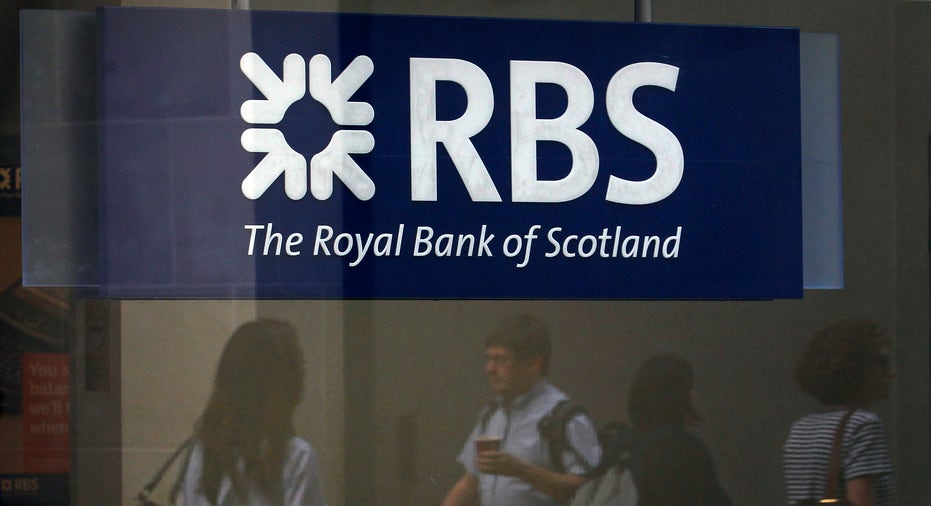Top UK Investors To File $2 Billion Legal Claims Against RBS

Five of Britain's biggest investors are set to file lawsuits against state-backed Royal Bank of Scotland next week, saying they were misled over its massive rights issue in 2008 and claiming more than 1 billion pounds back, sources said.
Legal & General - the biggest investor in RBS at the time of the rights issue - and Standard Life, Prudential, Aviva and Universities Superannuation Scheme (USS) are all expected to file claims in London's High Court on Wednesday, five people with knowledge of the matter told Reuters on Friday.
Former RBS boss Fred Goodwin asked shareholders to stump up 12 billion pounds in May 2008 to bolster the bank's capital position, which fell dangerously low after it bought parts of ABN Amro and lost billions on U.S. credit market assets.
Some of the lawsuits already filed against RBS over the rights issue also sue Goodwin, former chairman Tom McKillop and two other former executives. RBS is now being run by a new team and is 81 percent owned by the government, which still had to bail it out despite Goodwin's money-raising exercise.
The case is likely to take years to resolve and could cost RBS billions of pounds in compensation. It could also see Goodwin hauled into court as the bank's key witness.
RBS said it would defend the claims.
"While RBS and its former directors made some business decisions that have been criticized, this does not mean that they misled investors or acted illegally," it said.
"We believe we have strong defenses to the claims that are being brought against the group and that is why we intend to defend these vigorously and to protect the interests of our shareholders including UK taxpayers."
DEADLINE FOR CLAIMS
L&G, Standard Life and Prudential's M&G Investment Management were all top 10 shareholders and invested up to 1.2 billion pounds in the rights issue, according to Reuters calculations based on holdings at the time. USS and Aviva Investors were smaller investors, but both in the top 40.
They have all appointed law firm Quinn Emmanuel and their decision to file lawsuits should take claims related to the fundraising well over 4 billion pounds.
The investors and Quinn Emanuel declined to comment, but a source at one of the firms said its fund managers had a duty to consider a claim on behalf of its investors and a final decision would be based on the chances of recovering money.
There are big sums at stake. L&G would have invested about 620 million pounds in the rights issue if it took up its rights in full, so given the current value of the shares it could claim back about 500 million pounds after legal costs, according to Reuters calculations.
Standard Life would have spent 360 million pounds and M&G would have spent 220 million if they subscribed in full for their rights, according to Reuters estimates.
Wednesday will mark the sixth anniversary of the publication of RBS' rights issue prospectus, which could be seen as the deadline for claims under UK law's statute of limitations.
As a result there has been a rush among other investors to join action groups set up to take action against RBS, lawyers involved in the case have told Reuters.
"MUCKY END OF STICK"
The action groups contain a mix of shareholders, including UK pension funds, European and U.S. institutions, local authorities and many of the 63,204 small shareholders in the bank, including 21 in the Shetland Islands.
John Penney, a retired schoolteacher from Hyde, Cheshire, invested some 5,000 pounds in RBS and gave more when RBS asked.
"I had every faith that eventually the bank would come right," said 76-year-old Penney, who held an RBS account since he was three months old and in 1955 briefly worked for the bank.
"Some of the people who should have been looking after the interests of shareholders did not do that, and looked after themselves first and foremost," Penney told Reuters. "We seemed to have been left holding the mucky end of the stick."
The RBoS Action Group, which represents about 100 institutions and 12,000 retail investors, says RBS did not disclose how bad its capital position was, that its risk management and controls were "fundamentally flawed", and that the integration of ABN Amro business was not going well.
RBS's defense document, lodged in London's High Court in December and seen by Reuters, said "it was clear to the market" the bank's core capital ratio - a key measure of financial strength - was "significantly below 4 percent" at the time of the rights issue, even though it did not publish the figure.
RBS said its core capital ratio at the end of 2007 was 4.5 percent when it issued results in February 2008. Analysts had on several occasions asked RBS executives for more clarity on that number because it had been distorted by the complexity of its takeover of ABN Amro.
RBS grew from a small Scottish retail bank to one of the world's 10 biggest banks thanks to a series of aggressive takeovers. Its shares more than trebled in the 15 years up until the rights issue, even though they had halved from their peak in March 2007, but have slumped almost 90 percent since the rights issue.



















